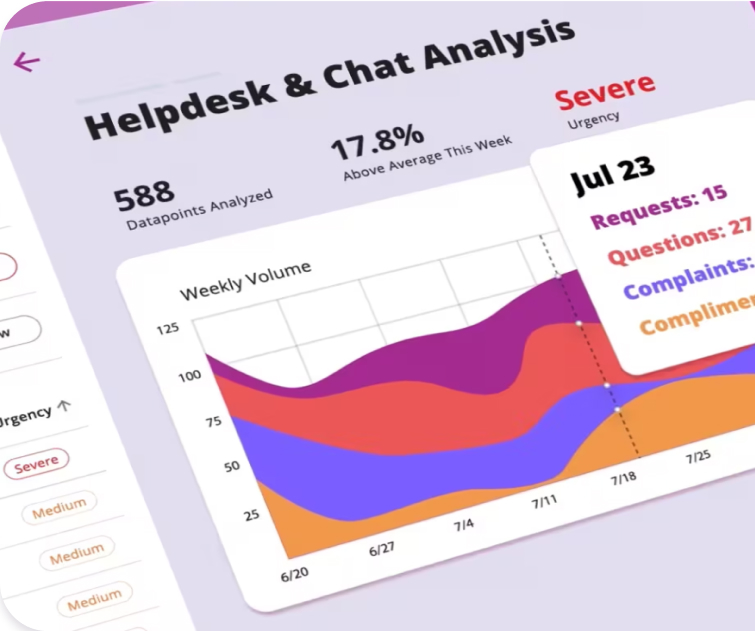
AI has the potential to revolutionize the way that product managers make decisions. Before, teams spent countless hours processing both quantitative and qualitative data, but that time is being cut down significantly thanks to machine learning and generative AI technologies. Now, product managers can quickly and accurately analyze large volumes of data, uncover hidden patterns and insights, and make more informed, strategic decisions faster.
Here are five key ways that AI can help product managers make better data-driven decisions:
- Improved data collection and processing. AI can help product managers automate and streamline the process of collecting and processing both quantitative and qualitative data from multiple sources. This can help reduce the time and effort required to gather data for analysis, eliminating the need to clean data or remove noise, and make it easier to integrate data from different sources.
- Enhanced data visualization. Artificial intelligence can also help PMs create more compelling and informative data visualizations. By using machine learning algorithms and natural language processing, product managers can generate interactive, dynamic charts and graphs that help them better understand and communicate data trends and patterns. This is an area in which we expect to see continued growth in the near-term.
- More accurate and reliable predictions. The latest advancements in AI enable product managers to make more accurate and reliable predictions about future market trends and customer behavior. By using predictive modeling and other AI techniques, product managers can gain a better understanding of how different factors will impact their products and business, and use this information to make more informed decisions.
- Enhanced customer insights. Generative AI empowers teams to gain deeper insights into their customers and target markets. By using AI-powered customer segmentation and analysis, product managers can better understand customer preferences and behavior, and use this information to tailor their products and marketing efforts to specific target audiences and user groups.
- Better data sharing and decision-making. Finally, AI can help improve collaboration and decision-making within teams and broader organizations. By using AI-powered collaboration and communication tools, product managers can share data and insights with their teams in real-time, and make more informed, data-driven decisions together.

Boost customer satisfaction with precise insights
Surface the most urgent topics by telling our AI what matters to you.
Eager to get started? Here are a handful of steps PMs can take to get their organization ready to use AI today:
- Identify key data sources and metrics. The first step toward using AI for data-driven decision-making is to identify the key data sources and metrics that are most relevant to your business and products. This may include data from customer feedback surveys, sales reports, market research studies, and other sources. Don't limit yourself to the same old sources you've always used; think outside the box. The power of AI is limitless and can open the door to utilizing data you never before thought possible, such as meeting transcripts.
- Evaluate and select the right AI tools. Once you've identified the key data sources and KPIs, the next step is to evaluate and select the right AI solutions for your needs. This may involve comparing different options and considering factors such as cost, capabilities, integration with other tools, and support. We may be biased, but if you need help with data analysis, we think Viable should be at the top of your list.
- Use AI to analyze and visualize your data. Once your data is prepared, you can begin using AI to analyze and visualize your reporting. This may involve using machine learning algorithms to uncover hidden patterns and insights, or creating interactive data visualizations to better understand and communicate data trends and patterns.
- Integrate AI insights into your decision-making processes. The final step is to integrate the insights from the AI-powered data analysis into your company's decision-making processes, ensuring you get buy-in from the appropriate stakeholders along the way. This may involve using AI-generated predictions to inform strategic planning, or using customer insights to tailor your products and marketing efforts to specific customer groups.
Today’s AI technologies have the potential to greatly enhance the capabilities of product managers and other professionals who want to make better data-driven decisions in a fast-paced environment. By using the right AI tools and techniques, PMs can drive team efficiency, organizational growth, and business success.
Curious to see how AI can help your product team make more data-informed choices?
Get your first report free.
%20(10).png)
%20(9).png)
%20(8).png)
